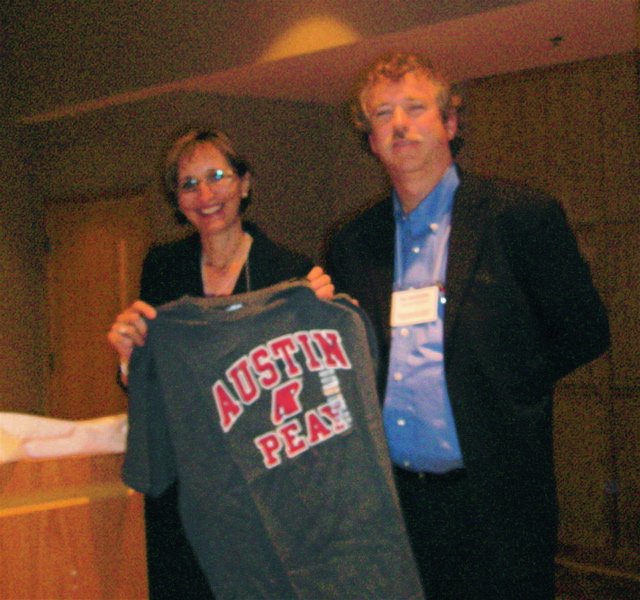 [Part II] Conference Luncheon and Afternoon Sessions
[Part II] Conference Luncheon and Afternoon Sessions
The February 28th PAT 2009 Regional Conference continued with a luncheon and afternoon sessions. This report covers those activities and discussions.

The luncheon keynote speaker was Ted Ownby, University of Mississippi, Professor of History and Southern Studies, Director of the Center for the Study of Southern Culture. His topic was “Free Bird, Roots, and Family Values: Southern Culture in the 1970s.” Ownby centered his talk on “What it means to be part of a family in the South in the 70’s.” Three elements must be considered. “The South in the 70’s is working out integration and is no longer a rural agrarian culture. The South is establishing a new relationship with the federal government.”
Southern Rock Music in the 70’s is dominated by groups such as The Lynyrd Skynyrd, The Greg Allman Band, The Allman Bros. , Charlie Daniels and ZZ Top. These bands, and others of their genre, focused on life on the road as an admirable endeavor and a worthwhile way of life. Unlike country music, these new Southern music advocates did not reminisce about being at home or a favorite pet dog, nor did they bemoan Mom or good times past or the hardships of growing up poor. These music groups glamorized the life of the wanderer. They held a distinct pride of the South and being Southern people. They acknowledged not all of Her Past was good, even alluded to a certain loss of mystique of the Old South, but defiantly defended The South from rebuke by non-Southerners, particularly Neil Young.

In 1976, Alex Haley published “Roots.” “Roots” is important in many ways. To American History and African American History, it shows the continuity from America back to Africa and the connection between the two continents. It proclaims, “Every child is important as the new thing in the world.” “Roots” highlighted the complexity of African American family life, showing the strength of the Black Family, it’s ability to adapt, to change to adapt to conditions and situations. In “Roots,” the flexibility of the Black Family, in all its many guises, was put on display before all the world.
“Roots” ultimately showed America the true definition of ‘Family’ as a group of people, not necessarily blood-related, who adapt to change and adapt to survive as a group with shared interests.”
The third element is the Rise of a New Religious Conservatism, the advent of the Religious Right. The South in the 70’s saw the rise of a religious movement that stressed that the family needs to be separated from the general society. This movement proclaimed that with the shifting winds of social change let loose by the civil rights movement, there was a need for the family to structure and conduct itself if it was to survive. The biblical ties in Southern culture have always been strong. The disruption to what had been ‘the accepted norm’ poised new questions and doubts to the family structure. To circumvent those doubts and restore a sense of stability and familiarity, this new religious conservatism arose. Groups such as American Family Values and the Morale Majority grew out of these precepts.

Dr. Uffelman presented Dr. Ownby with a APSU Sweatshirt as an appreciation token for his presence. Lane College was announced as the host for the next regional conference. In getting the promotion stream for that conference rolling, she displayed a souvenir shirt that was for sale at the register table as reminder to the attendants of what fun things to expect at Lane College.
She also took the opportunity to again acknowledge the hard work of her support team in coordinating the conference, thanking Dr. Dewey Broder, Pamela Allen, Dr. David Nelson for communications; Denise Richards-President, Julia Dittrich-Vice President, Leslie Crouch-Secretary, Theta Delta Chapter and especially Asia Parker, student assistant.
Following the luncheon and its celebrations, the afternoon panel sessions got under way. These panels continued the trend of the morning sessions, covering an equally compelling diverse range of subjects.
Panel 15: U.S. Military in Nontraditional Roles – “Deconstructing de-Ba?athification” by Ron Martz, Austin Peay State University; “United Nations Peacekeeping: At Birth and Today” by David Ogan, Austin Peay State University with Comments: Dr. Dewey Browder, Austin Peay State University.
Panel 16: American Revolution: Sea Battles – “Small Boat Operations in Long Island Sound, 1775-1779” by Eric Turner, Austin Peay State University; “Losing Command of the Sea: The Royal Navy in the American War 1775-1780 and Mast Shortages” by Andrew Breer, Austin Peay State University with Comments: Dr. Kevin Tanner, Austin Peay State University.
Panel 17: Labor and Economy in Nazi Germany – “Hitler?s Economics: A Truly Dismal Case in the History of Dismal Science” by William Austin Newsom, Maryville College; “Women and Nazi Germany” by Maggie Fields, Austin Peay State University with Comments: Prof. Antonio Thompson, Austin Peay State University.
Panel 18: Roundtable – MTSU Recent Projects in Public History- “You call that Progress?” Displaced Community Residents Reclaim Their Past” by Dollie Boyd, Middle Tennessee State University; “Family Tradition: the Williams Family Legacy” by Kristen Deathridge, Middle Tennessee State University, “Restoring Historic Photographs” by Ashleigh Oatts, Middle Tennessee State University; “?The Second Independence Hall? The Wesleyan Chapel of Seneca Falls, NY” by Elizabeth Smith, Middle Tennessee State University with Moderator: Rebecca Conard, Middle Tennessee State University.
Panel 19: Blues, Baseball and Black Male Identity – “?I Ain?t Gonna Raise No More Cotton, and Tell You the Reason I Say So”: Delta Blues Music?s Origins in Cotton Tenant Farming and Sharecropping” by Tyler Moore, Middle Tennessee State University; “The Memphis Red Sox: Barely Hanging On, 1947-1960” by Kathleen Cooper, Union University; “Generation Lost: The Creation of the African American Male Psyche” by Ash Johnson, Belmont University with Comments: Michael Bertrand, Tennessee State University.
Panel 20: Post WWII US Politics- “Harry S. Truman: The Enduring Southern Buck” by Julia Dittrich, Austin Peay State University; “Joseph McCarthy and the Power of Fear” by Meagan Kelly, University of Tennessee, Chattanooga; “Scalawags and Carpetbaggers: The Politics of George C. Wallace” by Stefanie Porter, Austin Peay State University with Comments: Terry Lindley, Union University.
Panel 21: American Influence Overseas: Two Perspectives, Direct And Policy-“William Walker: Putting Man? in Manifest Destiny” by Tonya Parham, University of Memphis; “Fruit of a Foe: Food as a Weapon in the Cold War” by Meghan O’Dea, University of Tennessee Chattanooga with Comments: Prof. Christos Frentzos, Austin Peay State University.
Sitting in on Panel 19: Blues, Baseball and Black Male Identity, the following highlights are conveyed.
Tyler Moore’ s presentati0n was titled ” I Ain’t Gonna Raise No More Cotton and Tell You the Reason I Say So: Delta Blues Music’s Origin in Cotton Tenant Farming and Sharecropping.”

Cotton farming in the Mississippi Delta was more productive than anywhere else in Southern farming. The Southern custom of single crop farming actually led to the South’s poor economic advance. Rotation of crops was not a farm tradition practiced in Delta cotton farming, nor tenant farming. Sharecropping was a perpetual farm labor system. The labor force was never able to retire the debts it accumulated during winter and the growing season. Black families dominated the tenant farming population in the South. This was especially so in the Mississippi Delta. Tenants were ever in debt to the landowner who controlled the price system which declared the price paid for a bale of cotton. The tenant farmers never knew the weight of their harvest, nor how much the landowners were paid for the crop. This way, the landowner kept the tenants in perpetual continuing debt. Middle Class white property owners saw sharecropping as the single and best means to control their labor source. As social norms changed, Mississippi took extreme measures to try to retain its feudal sharecropping system. During the Black Exodus from the South for the Harlem Renaissance, the state actually enacted laws forbidding its Black citizens from leaving.
As in any human situation of despair and suffering, a means of release and relief always comes into the fore. For the Black tenant farming population, that relief manifested itself in the creation of the ‘Delta Blues.’ Or more specifically ‘The Blues.’ Many of the pioneering legends of The Blues had their upbringing in the Mississippi Delta as the background for their inspiration. Songs always refer to some misfortune of the labors of tobacco farming, the abject poverty of that life, the lack of ever having something to call one’s own, the harshness of living in the South, the misfortunes of a love affair; all of these things were elements, if not actual topics of Blues songs. They still permeate the modern day Blues repertoire. Chicago’s Blues scene owes its very existence to the migration of Mississippi sharecroppers who managed to migrate there from their dire circumstances ‘Down South.’
Kathleen Cooper, Union University, presented “The Memphis Red Sox- Barely Hanfing On 1947-61960“

In the days of segregated baseball, colored baseball teams struggled to survive. The players did not enjoy the support system of their white counterparts. Sponsors were virtually nonexistent. Training and game facilities were never the parallel of the ‘Establishment’ teams. Among the Negro League, Memphis’s Red Sox enjoyed a unique existence. The Martin Brothers’ ownership of their own stadium contributed greatly to the Red Sox’s long tenure in pro-baseball. Martin Stadium was the homebase of Memphis Negro Baseball in the days of early integration of baseball following Jackie Robinson’s admission to White Pro Baseball. The Memphis Red Sox made extra efforts to attract attendance- beauty pageants, free give-a-ways, Ladies Night, special discounts on food, special menu items; all of these promotions were part of the allure of Red Sox Baseball in Memphis.
The Memphis Red Sox existed in the time of the Segregated South, in the South. Southern politics affected every aspect of Black Life and Baseball was no different. Edward “Boss’ Crump controlled politics in Memphis. The Martin Brothers partnered with Crump, which allowed them to become members of the Black High Society. Under Crump, Blacks were even allowed to vote, but they had to vote as Crump dictated. The era of segregation and racism had created a system of sub-culture entertainment and opportunity for Black baseball players.
Jackie Robinson’s admittance to White Pro Baseball heralded the end of the Negro League. With the rise of the Civil Rights Movement in the South, the institution of Black Baseball also felt pressure to be supportive, if not actually involved in the changing social tide. For team owners and operators like the Martin Brothers, this was not possible, from an economic standpoint. Their alliance with “Boss” Crump was incompatible with the growing demands from the African American community for recognition and support of the civil rights movement. When Dr. King sought to stage a rally at Martin Stadium, the brothers denied the request and a firestorm of outrage and protest ensued. Their connection to the Crump machine was a serious impediment to their endorsement or participation in the emerging struggle that was gripping the South.
Jackie Robinson’s breaking of the ‘Color Barrier’ opened the way for other Negro League players to switch over to the major leagues and this further stressed the Negro League’s ability to survive. The civil rights movement’s advancing pace also added to that stress as players saw their future more in the major leagues than in staying with the Negro League. A unique African American institution was brought down with the advance of equality and the struggle for civil rights.
The final paper of the panel was “Generations Lost: Creation of the African American Male Psyche” by Ash Johnson, Belmont University.

With Barack Obama having succeeded in becoming the 44th President of the United States and Commander-in-Chief and African American males lead major major corporations, sports teams and other segments of American society, many may think that American has become post-racial. This is not reality.
“While the cultural contributions of African American society is appreciated by White Society. But their physical presence is not.”
American society has greatly benefited from the many contributions of African Americans, Inventions by African Americans have made life more prosperous, convenient and safe. White America does appreciate the many contributions of African Americans, sometimes begrudgingly, but all the while creating endless tactics not to have to contend with their presence. There exists a perpetual unease in White America in accepting and acknowledging the physical presence of African Americans. This undercurrent of unease has had a continuing negative impact upon African Americans.
From the time of slavery, skin tone has been used as a device to create division within the African American community. Forced interracial congress upon African American female slaves by their slave masters introduced lighter skin tones into the population and discrimination based on skin tone crept into the slave demographics.These lighter skin toned slaves often were assigned to work in the slave-owners house as cooks, maids and hand-servants. Their days were immensely more tolerable than that of the field slaves.
Another tactic has been the practice of White Society to marginalize the African American male while elevating and praising the African American female. The African American male has suffered from the degradation of being portrayed as an inherently uncontrollable demon-monster, a slackard, a sexual aggressor, a mental deficient, a physical dynamo, inherently accomplished in entertainment, unreliable, not family oriented, inherently prone to criminal behavior, obsessed with interracial sexual congress-usually by force and being without salvation. Such labels place inhuman burdens upon the African American Male and work to unnaturally imperil the survival and success of their demographic.
Uncredited photos are by Turner McCullough Jr.
























